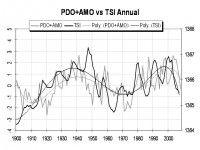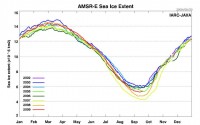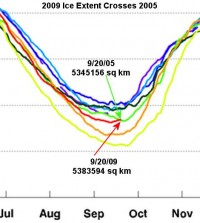Sep 23, 2009
Sydney dust storm; flight chaos, health worries
By Rohan Sullivan, AP
SYDNEY - Australia’s worst dust storm in 70 years blanketed the heavily populated east coast Wednesday in a cloud of red Outback grit, nearly closed the country’s largest airport and left millions of people coughing and sputtering in the streets.

No one was hurt as a result of the pall that swept in overnight, bringing an eerie orange dawn to Sydney, but ambulance services reported a spike in emergency calls from people with breathing difficulties, and police warned drivers to take it easy on the roads.
Dust clouds blowing east from Australia’s dry interior - parched even further by the worst drought on record - covered dozens of towns and cities in two states as strong winds snatched up tons of topsoil, threw it high into the sky and carried it hundreds of miles (kilometers).
International flights were diverted from Sydney to other cities - three from New Zealand were turned around altogether - and domestic schedules were thrown into chaos as operations at Sydney Airport were curtailed by unsafe visibility levels. Passenger ferries on the city’s famous harbor were also stopped for several hours for safety reasons.
The dust over Sydney had largely cleared by midafternoon, though national carrier Qantas said severe delays would last all day because of diverted and late-running flights.
The dust was still flying further north, however, and the sky over the Queensland state capital of Brisbane was clogged with dust into the early evening.
Such thick dust is rare over Sydney, and came along with other uncommon weather conditions across the country in recent days. Hailstorms have pummeled parts of the country this week, while other parts have been hit with an early spring mini-heatwave, and wildfires.
“It did feel like Armageddon because when I was in the kitchen looking out the skylight, there was this red glow coming through,” Sydney resident Karen told Australian Broadcasting Corp. radio.
The storms - visible as a huge brown smudge in satellite photographs of Australia on Wednesday - are the most severe since the 1940s, experts said. One was recorded traveling from southern Australia all the way to New Zealand some 1,400 miles (2,220 kilometers) away.
Officials said particle pollution in Sydney’s air rose to the worst on record Wednesday, and the New South Wales state ambulance service said it had received more than 250 calls before midday from people suffering breathing problems.
People with asthma or heart or lung diseases were urged not to go outside and to keep their medicine inhalers handy.
“Keeping yourself indoors today is the main thing to do if you have any of those conditions and particularly if you’re a known sensitive sufferer such as children, older adults or pregnant women,” said Wayne Smith, a senior state health official.
Sydney residents coughed and hacked their way through their morning commute, rubbing grit from their eyes. Some wore masks, wrapped their faces in scarves or pressed cloths over their noses and mouths.
“These dust storms are some of the largest in the last 70 years,” said Nigel Tapper, an environmental scientist at Monash University. “Ten very dry years over inland southern Australia and very strong westerlies have conspired to produce these storms.” See story here.
Note the 70 year cycles of solar (Total Solar Irradiance Hoyt/Schatten/Willson) and PDO, AMO (CDC).

The dryness last year was focused on Victoria in the southeast (recall the fires) while floods opccurred in Queensland in the north. This year it has been wet in the south especially in Victoria while Queensland and northern and central New South Wales have had drought.
Sep 23, 2009
Adapting to climate change through technology
By Paul Driessen
"Since when did you become a global warming alarmist?” I kidded Norman midway into our telephone conversation a few weeks before this amazing scientist and humanitarian died. “What are you talking about?” Dr. Borlaug retorted. “I’ve never believed that nonsense.” I read a couple sentences from his July 29 Wall Street Journal article. “Within the next four decades, the world’s farmers will have to double production on a shrinking land base and in the face of environmental demands caused by climate change. Indeed, [a recent Oxfam study concludes] that the multiple effects of climate change might reverse 50 years of work to end poverty.”
I mentioned that my own discussions of those issues typically emphasize how agricultural biotechnology, modern farming practices and other technological advances will make it easier to adapt to any climate changes, warmer or colder, whether caused by humans or by the same natural forces that brought countless climate shifts throughout Earth’s history.
“You’re right,” he said. “I should have been more careful. Next time, I’ll do that. And I’ll point out that the real disaster won[t be global warming. It’ll be global cooling, which would shorten growing seasons, and make entire regions less suitable for farming.” I was amazed, as I was every time we talked. Here he was, 95 years old, “retired,” still writing articles for the Journal, and planning what he’d say in his next column.
The article we were discussing, “Farmers can feed the world,” noted Norman’s deep satisfaction that G-8 countries have pledged $20 billion to help poor farmers acquire better seeds and fertilizer. “For those of us who have spent our lives working in agriculture,” he said, “focusing on growing food versus giving it away is a giant step forward.”
Our previous conversations confirm that he would likewise have applauded the World Bank’s recent decision to subsidize new coal-fired power plants, to generate jobs and reduce poverty, by helping poor countries bring electricity to 1.5 billion people who still don’t have it. For many poor countries, a chief economist for the Bank observed, coal is the only option, and “it would be immoral at this stage to say, ‘We want to have clean hands. Therefore we are not going to touch coal.’” Norman would have agreed.
“Governments,” he argued, “must make their decisions about access to new technologies...on the basis of science, and not to further political agendas.” That’s why he supported DDT to reduce malaria, biotechnology to fight hunger, and plentiful, reliable, affordable electricity to modernize China, India and other developing nations. His humanitarian instincts and commitment to science and poverty eradication also drove his skepticism about catastrophic climate change.
He was well aware that recent temperature data and observations of solar activity and sunspots indicate that the Earth could be entering a period of global cooling. He had a healthy distrust of climate models as a basis for energy and economic policy. And he knew most of Antarctica is gaining ice, and it would be simply impossible for Greenland or the South Pole region to melt under even the more extreme temperature projections from those questionable computer models. He also commented that humans had adapted to climate changes in the past, and would continue to do so. They would also learn from those experiences, developing new technologies and practices that would serve humanity well into the future.
The Ice Ages doubtless encouraged people to unlock the secrets of fire and sew warm clothing. The Little Ice Age spawned changes in societal structure, housing design, heating systems and agriculture. The Dust Bowl gave rise to contour farming, crop rotation, terracing and other improved farming practices. Norman’s dedication to science, keen powers of observation, dogged perseverance, and willingness to live for years with his family in Mexico, India and Pakistan resulted in the first Green Revolution. It vastly improved farming in many nations, saved countless lives, and converted Mexico and India from starving grain importers to self-sufficient exporters.
In his later years, he became a champion of biotechnology, as the foundation of a second Green Revolution, especially for small-holder farmers in remote parts of Africa. Paul Ehrlich and other environmentalists derided his ultimately successful attempt to defuse “The Population Bomb” through his initial agricultural advances, and attacked him for his commitment to biotechnology. His response to the latter assaults was typically blunt. “There are 6.6 billion people on the planet today. With organic farming, we could only feed 4 billion of them. Which 2 billion would volunteer to die?”
The Atlantic Monthly estimated that Norman’s work saved a billion lives. Leon Hesser titled his biography of Borlaug The Man Who Fed the World. Competitive Enterprise Institute senior fellow Greg Conko dubbed him a “modern Prometheus.” Science reporter Greg Easterbrook saluted him as the “forgotten benefactor of mankind.” And the magician-comedy-political team of Penn and Teller said he was “the greatest human being who ever lived.”
He deserved every award and accolade - and merited far more fame in the United States than he received, though he was well known in India, Mexico and Pakistan, where his work had made such a difference.
Norman was also a devoted family man and educator. He served as Distinguished Professor of International Agriculture at Texas A&M University into his nineties. A year and a half ago, he gladly spent 40 minutes on the telephone with my daughter, who interviewed him for a high school freshman English “true hero” paper - and did so just after returning from the hospital and on the one-year anniversary of his beloved wife Margaret’s death.
He told my daughter it was because of Margaret, “and her faith in me and what I was doing, that we were able to live in Mexico, under conditions that weren’t nearly as good as what we could have had in the United States, and I was able to do my work on wheat and other crops.”
I sent him occasional articles, and we talked every few months, about biotech, global warming, malaria eradication, some new scientific report one of us had seen, or some website he thought I should visit. As we wrapped up our early August chat, we promised to talk again soon. Sadly, he entered a hospice and passed away before that could happen.
His mind was “still as clear as ever,” his daughter Jeanie told me, but his body was giving out. To the very end, Norman was concerned about Africa and dedicated to the humanitarian and scientific principles that had guided his life and research, and earned him the 1970 Nobel Peace Prize. Norman left us a remarkable legacy. But as he told my daughter, “There is no final answer. We have to keep doing research, if we are to keep growing more nutritious food for more people.” The world, its climate and insect pathogens will continue to change. It is vital that we sustain the incredible agricultural revolution that Norman Borlaug began.
Paul Driessen is senior policy advisor for the Committee For A Constructive Tomorrow and Congress of Racial Equality, and author of Eco-Imperialism: Green power; Black death.
Sep 22, 2009
2009 Arctic Sea Ice Extent exceeds 2005 for this date
By Anthony Watts, Watts Up With That
Those that have been watching the IARC-JAXA Arctic sea ice plot, and noting the slope of gain, rather expected this to happen. Today it did.
Here’s the current IARC-JAXA Sea Ice Extent plot:

See larger image here.
And here is the plot magnified and annotated to show the crossing:

See larger image here.
While 2009 minimum on 09/13 of 5,249,844 was just 65,312 sq km below 2005 in minimum extent, which occurred on 9/22/2005 with 5,315,156 sq km, it has now rebounded quickly and is higher by 38,438 sq km, just 2 days before the 9/22/05 minimum. On 9/22/2009 it may very well be close to 60-80,000 sq km higher than the minimum on the same date in 2005.
While by itself this event isn’t all that significant, it does illustrate the continued rebound for the second year. The fact that we only missed the 2005 minimum by 65,312, which is about one days worth of melt during many days of the melt season is also noteworthy. See more and comments here.
Icecap Note:
We also as of the 20th were running 25.7% greater than 2007.

See larger image here.

Compare 2007 with 2009 image here.
Sep 21, 2009
UN Plans Green ‘Shock Therapy’ (Read Lying Campaign): Climate Activists to Sway Poor Nations
By Suzanne Goldenberg, US environment correspondent
The United Nations is planning a form of diplomatic shock therapy for world leaders this week in the hope of injecting badly needed urgency into negotiations for a climate change treaty that, it is now widely acknowledged, are dangerously adrift.
UN chief Ban Ki-Moon and negotiators say that unless they can convert world leaders into committed advocates of radical action, it will be very hard to reach a credible and enforceable agreement to avoid the most devastating consequences of climate change.
As the digital counter ticking off the hours to the Copenhagen summit - which had been supposed to seal the deal on climate change - hit 77 days today, progress at the UN summit in New York is seen as vital. Nearly 100 heads of state and government are to attend the summit, for which a pared-down format has been devised.
“We need these leaders to go outside their usual comfort zones,” said one diplomat. “Our sense is that leaders have got a little too cosy and comfortable. They really have to hear from countries that are vulnerable
and suffering.”
Rajendra Pachauri, head of the Intergovernmental Panel on Climate Change, which won the Nobel peace prize with Al Gore, agreed. Commenting on the leaders attending the G20 summit in Pittsburgh next week, he said: “We need to remind these people about impacts of climate change - the fact that they are inequitable and fall very heavily on some of the poorest people in the world. We are likely to see a large number of failed states if we don’t act in time.”
The heads of state attending the UN summit are to be stripped of their entourages. Each will be allowed just one aide, generally their country’s environment minister, in the sessions. Instead of set-piece speeches, leaders will be paired off to chair discussion groups. Britain will be with Guyana, Tuvalu with the
Netherlands, and Mongolia with the European commission.
The leaders will also lunch with environmental activists and chief executives of corporations who have been pressing their governments for action. At dinner, the leaders of the biggest polluting countries will dine with the leaders of Bangladesh, Kiribati and Costa Rica - which are among the primary victims of climate change.
By the end of the day, the rationale goes, the leaders will be imbued with a new sense of purpose. Leaders of rich countries will have been galvanised to take on the big emissions cuts - 25-40% over the next decade, 80% by 2050 - needed to keep temperatures from rising more than two degrees above pre-industrial levels, the temperature set by science to avoid the most calamitous effects of climate change.
The leaders will also, it is hoped, have some understanding of the threat to poorer countries. And, at the very least, they will have more of a common purpose in tackling the problem. “We need to gather together. We don’t want to blame or point fingers at each other,” said Yaqoub al-Sanada, counsellor at the Kuwaiti mission to the UN. Kuwait - one of the biggest producers of oil - will co-chair a discussion session with Finland.
The UN is hoping for help from Barack Obama. The US president will speak at the session, and there is anticipation he will deliver a strong signal that America is committed to action. There is growing anxiety for those kinds of reassurances, especially as opposition to Obama’s green agenda grows in Congress. “The first question I get any time I meet with anybody is, ‘Where’s the legislation? How’s it going?’,” Todd Stern, the State Department’s climate change envoy, said. There are also reports that China’s president, Hu Jintao, in his first appearance at the UN, will announce new commitments to curb pollution - the kind of signal that will be crucial to boost negotiations in the days leading up to Copenhagen.
Read story here. H/T Dr. Benny Peiser, CCNet
Expect to hear “it is far worse than anyone thought”, “the ten warmest years have all occurred in the last dozen years”, “sea level rises are accelerating”, “extreme weather is increasing worldwide”, “oceans are warmest they have ever been”, the “arctic is melting at an alarming rate and will soon be gone”, “Greenland and Antarctic ice is melting rapidly threatening sea level rises”, “more and more species are being endangered by changes to climate”, “heat waves are increasing rapidly and will grow worse in years ahead”, “a future of increasing drought will lead to famines"- each and every one a blatant lie. Read the real story in this attached summary of talking points with hyperlinks.
Sep 17, 2009
NOAA: Warmest Global Sea-Surface Temperatures for August and Summer
By Anthony Watts, Watts Up With That
From the NOAA press release, just in time for Copenhagen. Of course the satellite record for August tells another story that is not quite so alarming as NCDC’s take on it.
AMS Fellow and CCM, Joe D’Aleo of ICECAP has this to say about it:.
Icecap Note: to enable them to make the case the oceans are warming, NOAA chose to remove satellite input into their global ocean estimation and not make any attempt to operationally use Argo data in the process. This resulted in a jump of 0.2C or more and ‘a new ocean warmth record’ in July. ARGO tells us this is another example of NOAA’s inexplicable decision to corrupt data to support political agendas.
- Anthony
NOAA Excerpts:

Global surface temperature anomalies for the month of August 2009. Temperature is compared to the average global temperature from 1961-1990.
Visualization of world’s land and ocean surface temperature.
High resolution (Credit: NOAA)
The world’s ocean surface temperature was the warmest for any August on record, and the warmest on record averaged for any June-August (Northern Hemisphere summer/Southern Hemisphere winter) season according to NOAA’s National Climatic Data Center in Asheville, N.C. The preliminary analysis is based on records dating back to 1880.
NCDC scientists also reported that the combined average global land and ocean surface temperature for August was second warmest on record, behind 1998. For the June-August 2009 season, the combined global land and ocean surface temperature was third warmest on record.
Global Highlights - Summer
The June-August worldwide ocean surface temperature was also the warmest on record at 62.5 degrees F, 1.04 degrees F above the 20th century average of 61.5 degrees F.
The combined global land and ocean average surface temperature for the June-August season was 61.2 degrees F, which is the third warmest on record and 1.06 degrees F above the 20th century average of 60.1 degrees F.
Global Highlights - August
The worldwide ocean surface temperature of 62.4 degrees F was the warmest on record for any August, and 1.03 degrees F above the 20th century average of 61.4 degrees F.
Icecap Note: What can I say. Between the station dropout (80% of the world’s stations, mostly rural), removal in US or absence globally of any UHI adjustment, bad siting for 90% of the climate stations and the recent removal of satellite input into the ocean temperature assessments, NOAA has ensured that each and every month and season will rank and ‘validate’ their piece of excrement called CCSP and support the governments argument for Cap-and-Tax, carbon regulations and global actions at Copenhagen. This is not an indictment of the hard-working and honest rank-and-file NOAA employees at the local offices and even behind the scenes at NCDC. It is the fault of higher ups and managers whose jobs and reputations rely on perpetrating the global warming hoax long enough so the governments can have their way to control virtually every aspect of our lives and keep the funding at the highest possible level for those who have abused the science to their benefit. See also here, here and here.
|









